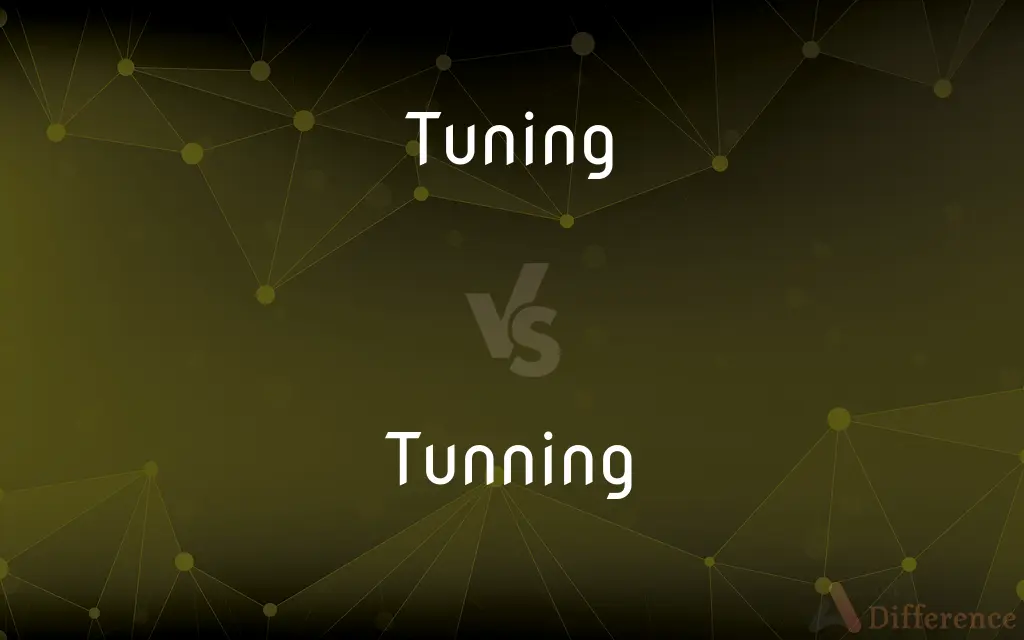Tuning vs. Tunning — What's the Difference?
By Tayyaba Rehman — Published on October 20, 2023
"Tuning" refers to the adjustment of musical instruments or electronic systems to achieve the desired pitch or optimal functionality, while "Tunning" is not a standard English word and is likely a misspelling of "tuning."

Difference Between Tuning and Tunning
Table of Contents
ADVERTISEMENT
Key Differences
The concept of "Tuning" is well-defined within the realms of music and technology. In music, it pertains to the meticulous adjustment of the pitch of a musical instrument to align it with a certain tonal standard. This process is critical for harmonious musical expression, ensuring that instruments produce the correct sound frequencies when played. On the other hand, "Tunning" lacks a formal definition or application in standard English, seemingly appearing as a typographical error or a misspelling of "Tuning."
"Tuning" also finds application in technology and engineering, where it refers to the adjustment or calibration of equipment or systems to ensure optimal performance. Whether fine-tuning a radio to receive a clear signal or adjusting the parameters of a computer program, tuning is integral to achieving desired outcomes and efficient operation. In contrast, "Tunning," having no recognized meaning or application, does not contribute to discourse in a meaningful way, serving instead as a potential source of confusion or misunderstanding.
In the context of automobiles, "tuning" often involves modifying and optimizing the vehicle's performance, handling, or appearance. Such modifications can range from adjustments to the engine, suspension, and exhaust system to enhancements of the vehicle's aesthetics. Meanwhile, "Tunning," absent in standard dictionaries and without recognized usage, remains irrelevant in discussions relating to adjustments or modifications of vehicles or any other context.
In summary, "Tuning" is a multifaceted term with significant applications in various fields like music, technology, and automobiles, crucial for achieving harmonious sounds, optimal performance, or modified characteristics. "Tunning," on the other hand, is devoid of meaning and application in standard English, likely representing a misspelling or error in writing.
Comparison Chart
Definition
Adjustment of musical instruments or systems.
Not a recognized word in standard English.
ADVERTISEMENT
Application
In music, technology, automobiles, etc.
No application due to being a likely misspelling.
Recognized Usage
Standard usage in various contexts.
No recognized usage in English language.
Contribution to Discourse
Significant in discussions of adjustments or calibrations.
Does not contribute to meaningful discourse.
Presence in Standard English
Present and well-defined.
Absent and undefined.
Compare with Definitions
Tuning
The calibration or modification of a system or equipment for optimal performance.
The tuning of the engine significantly improved the car’s performance.
Tunning
Absent in standard dictionaries and language resources.
Not applicable.
Tuning
The process of adjusting the frequency of a receiving set to receive a desired signal.
Proper radio tuning allowed us to catch the signal of a distant station.
Tunning
There is no recognized definition of "Tunning" as it is not a standard English word.
Not applicable.
Tuning
The state of being in correct pitch
Sang out of tune.
Played in tune with the piano.
Tunning
Likely a misspelling or typographical error for "Tuning."
Not applicable.
Tuning
The adjustment of the pitch of a musical instrument.
The piano needs tuning to produce harmonious sound.
Tunning
Does not have a recognized application or meaning in English discourse.
Not applicable.
Tuning
The act of optimizing software parameters for better results.
Database tuning is crucial for improving system performance and efficiency.
Tunning
Irrelevant in discussions and does not contribute to meaningful dialogue.
Not applicable.
Tuning
A melody, especially a simple and easily remembered one.
Tunning
Present participle of tun
Tuning
A song.
Tuning
(Obsolete) A musical tone.
Tuning
Concord or agreement; harmony
In tune with the times.
Tuning
(Archaic) Frame of mind; disposition.
Tuning
(Electronics) Adjustment of a receiver or circuit for maximum response to a given signal or frequency.
Tuning
(Music) To put into proper pitch
Tuned the violin.
Tuning
(Archaic) To utter musically; sing.
Tuning
To adjust (an electronic receiver) to a desired frequency.
Tuning
To adjust (an electronic circuit) so as to make it resonant with a given input signal.
Tuning
To adjust (an engine, for example) for maximum usability or performance.
Tuning
To adjust the wavelength output of (a laser).
Tuning
To become attuned.
Tuning
Action of the verb to tune.
Tuning
The calibration of a musical instrument to a standard pitch.
Tuning
(engineering) The adjustment of a system or circuit to secure optimum performance.
Tuning
Present participle of tune
Tuning
(music) calibrating something (an instrument or electronic circuit) to a standard frequency
Tuning
The modification of a vehicle's performance or appearance.
Car enthusiasts often invest in tuning to enhance their vehicles’ aesthetics and functionality.
Common Curiosities
How is Tuning applied in technology?
In technology, Tuning involves the adjustment or calibration of systems or equipment to ensure optimal performance and functionality.
Is Tunning a recognized word in standard English?
No, Tunning is not a recognized word in standard English and is likely a misspelling of "Tuning."
What does Tuning refer to in music?
In music, Tuning refers to the adjustment of the pitch of a musical instrument to align with a certain tonal standard.
Does Tunning have any application in English discourse?
No, Tunning has no recognized application or meaning in English discourse and does not contribute to meaningful dialogue.
Is Tuning significant in the automotive industry?
Yes, in the automotive industry, Tuning is significant and often involves modifying and optimizing a vehicle's performance, handling, or appearance.
Is Tunning present in any standard dictionaries?
No, Tunning is absent in standard dictionaries and language resources, having no defined meaning or application.
Can Tunning be considered a standard usage in any context?
No, Tunning is not considered standard usage in any context and is not recognized in the English language.
Can Tuning refer to the optimization of software parameters?
Yes, Tuning can refer to the act of optimizing software parameters to achieve better performance and results.
Can Tuning involve the modification of vehicles for enhanced aesthetics?
Yes, Tuning can involve modifications to a vehicle’s appearance, along with performance enhancements, for a more personalized and improved aesthetic.
Can Tunning be considered a contribution to meaningful discussion?
No, Tunning, being a likely typographical error and devoid of recognized meaning, does not contribute to meaningful discussion.
Is Tuning essential for achieving harmonious sounds in musical instruments?
Yes, Tuning is essential in music to ensure that instruments produce harmonious sounds by adjusting their pitch to align with a certain tonal standard.
How is Tuning utilized in radios?
In radios, Tuning is utilized to adjust the frequency of a receiving set to connect with a desired signal clearly.
Is Tunning a recognized abbreviation or acronym for any term or concept?
No, Tunning is not a recognized abbreviation or acronym for any term or concept in standard English.
Does Tunning have any recognized spelling variants or alternatives?
No, Tunning does not have recognized spelling variants or alternatives as it is not a valid or standard word in English.
Share Your Discovery

Previous Comparison
Strategy Formulation vs. Strategy Implementation
Next Comparison
BPO vs. KPOAuthor Spotlight
Written by
Tayyaba RehmanTayyaba Rehman is a distinguished writer, currently serving as a primary contributor to askdifference.com. As a researcher in semantics and etymology, Tayyaba's passion for the complexity of languages and their distinctions has found a perfect home on the platform. Tayyaba delves into the intricacies of language, distinguishing between commonly confused words and phrases, thereby providing clarity for readers worldwide.














































